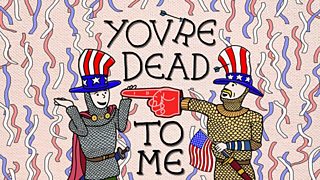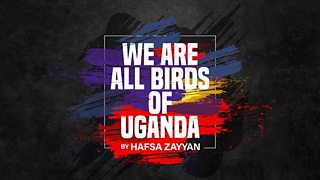I witnessed the plane crash that killed my sisters
The start of a new school term was always tinged with sadness for Harriet Ware-Austin. After fun-filled holidays spent roaming villages in Ethiopia, Harriet would have to bid farewell to her older sisters, Jane and Caroline.
On 18 April 1972, Harriet and her parents stood at the viewing platform of Addis Ababa airport to wave the girls off on their journey back to boarding school. This would be the last time they saw the pair alive and well together. Within moments of the plane taxiing down the runway, it crash-landed, and from the safety of the viewing platform, 8-year-old Harriet witnessed the crash that ultimately killed her beloved sisters.
In Life Changing, Jane Garvey hears from those who have survived events that change the course of their life beyond recognition. This is Harriet’s story.
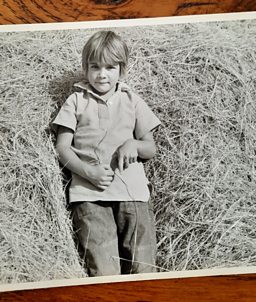
A wild life
Harriet’s early childhood would be a dream existence for many. She lived in Ethiopia, where her father was setting up a soil conservation programme. Harriet’s mother would teach her for two hours a day, and the rest of the time she would be free to saddle up and go exploring on her horse. Harriet recalls: “I just lived a wild life roaming the range on my horses. I used to ride around into the villages and into the hills.” This earned her a nickname from the locals: "The little girl on the big white horse."
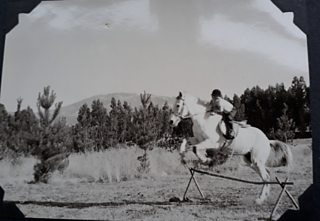
When term time finished, her sisters would return to Ethiopia from boarding school in the UK. “We had wonderful times while they were out there. We used to travel off to places, and quite often on a Sunday we’d go to a nearby swimming pool in a place called Ambo. They were natural springs, and the water was bright green! We used to go and have wonderful days there, the time just seemed to be packed with fun, and normal family stuff.” Yet these halcyon days were tinged with a feeling of dread for Harriet and her mother, who knew that before long her sisters would have to go abroad again.
The waving base
Whenever it was time for Jane and Caroline to head back to boarding school, Harriet and her parents would accompany them to the airport to wave them off. “We always took them and we waited till they’d gone.” They would stand at a balcony, known as a waving base, from where they could see the passengers walk out to the plane. In the early '70s, air travel was far more of a novelty than it is today, Harriet remembers. “People would spend the day at the airport because it was something amazing to see these things fly in.” It was there, on the waving base at Addis Ababa airport, that Harriet and her parents waved goodbye to Jane, aged 14, and Caroline, 12, for the final time on 18 April 1972.
A screeching of brakes and a plume of black smoke
“There were quite a lot of people there, mostly watching children flying back to school,” Harriet recalls. She describes how the plane did all the "normal things" before take-off, but it soon became apparent that something was very wrong. “It thundered down the runway, and then, all of a sudden, this great big plume of black smoke came up, and there had been a very loud shrieking of brakes.”
The plane did all the ‘normal things’ before take-off, but it soon became apparent that something was very wrong.
Earlier that day, a tiny loading hook had fallen off another plane and landed on the runway. This punctured the plane’s front wheel, sending rubber from the tyre into one of the engines. Harriet explains: “Then it went down, and the pilot tried to brake, but then the other wheels punctured and the rubber was flying into the engines, but it had no power so it couldn’t take off. There was a 30m drop at the end of the runway. The pilot did everything right but, of course, he had no control. It veered around in the grass and then it fell off this cliff at the end, and split open and caught fire because it had full fuel tanks.”
Over half the passengers got off the plane, but Caroline and Jane hadn’t been sitting next to one another and were split up. “Caroline was sitting next to a friend, and they undid each other’s seatbelts because their hands were shaking too much. They had to jump, and they were holding hands, but they got separated, and Caroline ran the wrong way. She ran down the hill where the fuel was going, so she was consumed by fire.” The area was surrounded by barbed wire, Harriet remembers, and “having been burnt so badly, poor little girl, she ran into this barbed wire.” Caroline’s friend ran up the hill instead, and survived.
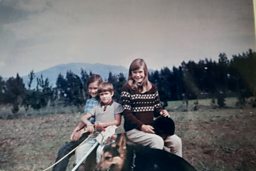
Everyone was quiet
As soon as he saw the plane catch fire, Harriet’s father and a friend jumped into a Land Rover and drove to the wreckage. “He was running round and round it, looking and screaming for them.” He found Caroline caught in the barbed wire. From there she was taken to a Seventh Day Adventist hospital. Meanwhile, Harriet’s mother made an astonishing split-second decision. Knowing that her reaction to the accident could dictate the course of the rest of Harriet’s life, she calmly took Harriet’s hand. “We just quietly stood there. Everyone was quiet, just the stunned disbelief. Some people hugged each other, but you cannot believe what you’re looking at. It’s just a numb, stunned sensation. You don’t know what to do. My father had to go and get there [to the wreckage], but Mum was already thinking of me – she couldn’t do that. She just had to be there. We were just frozen there while we waited.”
So much of the day remains clear in Harriet’s mind, but she has no recollection of how they got to the hospital. While waiting outside, she found herself with Debbie, the girl who had been sitting next to Caroline on the plane. Debbie was taken to be treated, and Harriet was left in the passageway, outside the room where Caroline was. From where she sat, she could see “some pretty horrible sights as they brought in dying and very badly injured people.”
“Jane must be dead”
Harriet recalls her mother turning to her and saying: “Jane must be dead.” While her parents returned to the hospital, Harriet was left in various houses. “I remember sitting in this room with a pile of books and a stuffed bird on the wall in the first house. I heard the sound of a funeral in the street – Ethiopian funerals are very loud. I could hear the unmistakable sound of the drums and I remember thinking ‘Oh my God, they’re having Jane’s funeral and they’ve forgotten me!’ Of course, it wasn’t Jane’s funeral.”
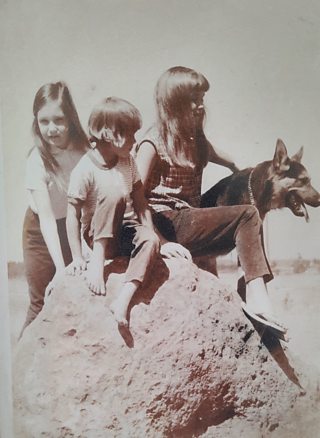
Eventually, a plane was sent out to collect the family and take them back to England. Their mother was given half an hour to pack up the family’s belongings. On the plane home, they were reunited with Caroline. “That was the last time I saw my sister. They had three stretcher beds in the middle of the plane, and the badly burnt victims were there. That was when I saw her – she was in a bad way.” Jane had died on impact at the time of the crash. “Her seatbelt killed her. It made me hate seatbelts for years, which wasn’t very logical, but anyway. She died on the 18th. We got back to Brize Norton, and Caroline died at 2 o’clock the next morning, which was the 22nd.”
Our world turned inside out
Despite the horrors Harriet witnessed, she was offered no form of counselling to work through her experience. She says that now she has a tendency to “blurt out about it to most people”, and has an “illogical, irrational” tendency to warn people about sending their children to boarding school. The event had a profound effect on her father too. “He described how, as he was running round looking for my sister, that he was being violently sick. He was never really very healthy again. He did die much too soon, he was only in his sixties. We have no doubt it had an influence.”
Harriet now works as a human rights consultant, a job which sends her travelling all over the world. She says that, despite all that she went through, her mother has been “brilliant” in encouraging her ambitions. “She totally understands that it’s something that I’m passionate about and I have to do. It’s awful for her, but I’m incredibly grateful.”
The Goodbye Messages
When the girls were in Ethiopia, their father had bought a tape recorder, which he would use to record music and snippets of the girls talking and singing. “Caroline had a beautiful singing voice, and Dad would record her singing on the tape machine. Then Jane would demand to be recorded and she’d do an imitation, and do it really, really badly. She was definitely a real jester.” At the end of each holiday, Jane and Caroline would record farewell messages for the family. Almost 50 years later, Harriet still has the final messages they recorded on the morning of the accident.

"Right... I don't know what to say about that."
Jane Garvey listens to "farewell" messages made heartbreaking by what happened next.
They’re entitled to be heard
Harriet’s mother has found it too difficult to listen to the girls’ messages since their father died 22 years ago, but Harriet still listens to the recordings. “It’s very hard to listen, but it’s also incredibly valuable and precious that those voices can be preserved. I think they’re entitled to be heard.” Harriet describes herself as someone who wears her heart on her sleeve, and as such she is always very open about what happened to her sisters. “It’s totally part of me. I can’t not. It’s not fair on them to be shut out, it’s bad enough that they lost their lives.”
Where are all the relatives and survivors?
Harriet has returned to Ethiopia many times over the years for work. Although she finds it emotionally difficult, she likes going there as it “keeps the connection alive” with Caroline and Jane. She still thinks about the other passengers who were on the plane with her sisters. “I would just love to know how other people’s lives have been. I think I’ve been very lucky my life has worked out. Although there’s this enormous, great black sadness, I’ve had some other wonderful things. I’d love to know how other people are, and what’s happened to them. I’d be fascinated to know, ‘has this driven and dominated your life as well? How have you dealt with it?’ Each of these links, they’re a living link with my sisters. There must be those other people, somewhere, for whom this was the beginning and the end as well.”
If you'd like to share anything you've heard or you were there at the time of the event at Addis Ababa Airport in 1972, you can get in touch here: lifechanging@bbc.co.uk
Listen to the full episode now on �鶹�� Sounds.

More compelling listening on Radio 4
-
![]()
Just One Thing: Cold Showers
Michael Mosley discovers how a burst of cold water could lift your mood, reduce your stress and boost your immune system.
-
![]()
39 Ways To Save The Planet: Polluter Plays
There are already examples around the world where the manufacturer helps to pay for the safe disposal of waste from their goods once used - such as electronic items or bottles. But what about the carbon dioxide produced from fossil fuels?
-
![]()
You're Dead To Me: Prohibition in the USA
Greg Jenner is joined by historian Prof Sarah Churchwell and comedian Kemah Bob in 1920s USA to hear about the implementation and after effects of Prohibition.
-
![]()
We Are All Birds Of Uganda
Themes of romance and exile combine with a stunning portrayal of modern Uganda as a young man tries to find his place in the world.


